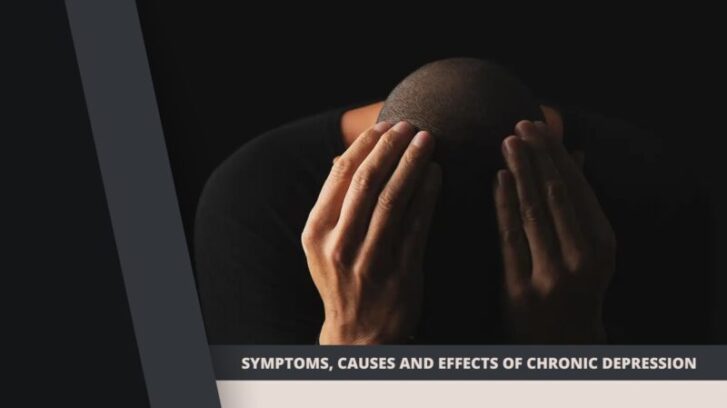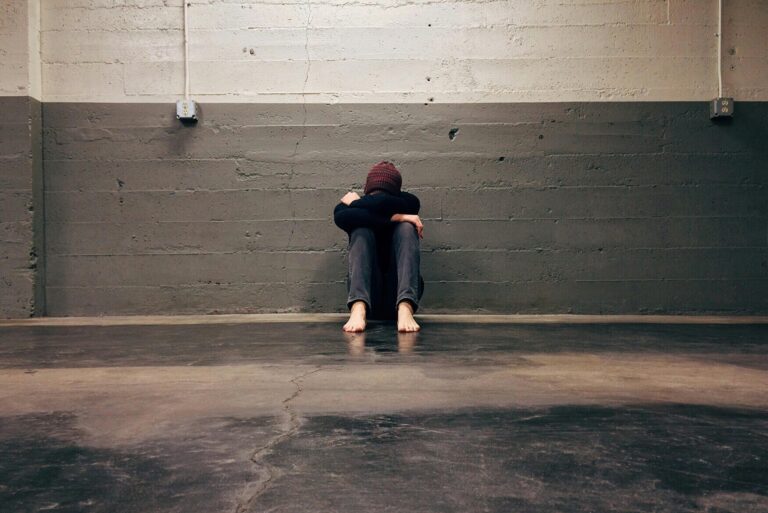Also known as persistent depressive disorder or dysthymia, is a prevalent mental health condition that affects a significant portion of the population. Unlike temporary feelings of sadness or low mood, chronic depression is characterized by persistent and long-lasting symptoms that can significantly impact a person’s quality of life.
In this article, we will explore the symptoms, causes, and effects of chronic depression, shedding light on this often misunderstood condition and offering insights for individuals experiencing it or those seeking to support loved ones.
Symptoms
A persistent and debilitating condition, manifests through a wide range of symptoms that affect an individual’s emotional well-being and daily functioning. Recognizing these symptoms is crucial in understanding and addressing this condition.
The most common symptom of chronic depression is enduring feelings of sadness, which may persist for weeks or months on end. Individuals often lose interest or pleasure in activities they once enjoyed, experiencing a general sense of apathy or detachment. Chronic depression also leads to persistent fatigue and a lack of energy, making even simple tasks seem overwhelming. Additionally, changes in appetite and sleep patterns are common, with some individuals experiencing weight loss or gain and disturbances in their sleep-wake cycle.
Negative thoughts become a constant companion for those with chronic depression. They may struggle with feelings of worthlessness, guilt, and a distorted self-perception. Concentration and decision-making become challenging, leading to difficulties in school or work. Furthermore, recurring thoughts of death or suicide may be present, increasing the risk of self-harm.
Identifying these symptoms is essential in differentiating chronic depression from temporary sadness or low mood. If you or someone you know is experiencing these persistent and distressing symptoms, seeking professional help is crucial for proper diagnosis and effective treatment.
Causes of Chronic Depression
Complex condition are influenced by various factors, including biological, environmental, and psychological components. Understanding these causes provides valuable insights into the development and maintenance of this condition.
Biological factors play a significant role in chronic depression. Research suggests a genetic predisposition, indicating that individuals with a family history of depression are more likely to develop the condition themselves. Neurochemical imbalances, such as decreased levels of serotonin and norepinephrine, impact mood regulation and contribute to depressive symptoms. Hormonal influences, particularly in women, also play a role, as evidenced by the higher prevalence of chronic depression during hormonal fluctuations, such as postpartum and menopause.
Environmental factors can trigger or exacerbate chronic depression. Traumatic life events, such as the loss of a loved one, abuse, or a major life transition, can contribute to the development of this condition. Chronic stress, resulting from ongoing difficulties at work, financial strain, or relationship problems, can also be a significant factor. Moreover, adverse experiences during childhood, including neglect, abuse, or a disrupted family environment, increase vulnerability later in life.
Psychological factors further influence chronic depression. Certain personality traits, such as a tendency toward perfectionism or pessimism, increase the likelihood of developing the condition. Cognitive patterns characterized by negative thinking styles, self-criticism, and rumination can perpetuate and intensify depressive symptoms. Learned helplessness, a belief that one has no control over their circumstances or the ability to change them, can also contribute to chronic depression.
By considering these various factors, it becomes evident that chronic depression is a multifaceted condition with a range of causative elements. Addressing these causes holistically is essential for effective treatment and management of chronic depression.
Effects
Far-reaching effects on an individual’s overall well-being, daily functioning, and relationships. It is important to recognize and acknowledge these effects to fully comprehend the impact of this condition.
One of the most significant effects of chronic depression is the impairment of daily functioning. Individuals may struggle to fulfill their responsibilities at work or school, leading to decreased productivity and potential career or academic setbacks. Additionally, chronic depression can strain relationships with family, friends, and romantic partners. The emotional and behavioral changes associated with the condition often result in decreased social interactions, withdrawal, and feelings of isolation, further exacerbating the sense of disconnection.
Physical health complications also arise from chronic depression. The condition is associated with an increased risk of cardiovascular problems, such as heart disease and stroke, due to the physiological impact of chronic stress on the body. The immune system may become weakened, leading to a higher susceptibility to infections and illnesses. Furthermore, sleep disturbances, commonly experienced by individuals with chronic depression, can further compromise overall health and well-being.
Perhaps one of the most concerning effects of chronic depression is the heightened risk of suicidal thoughts and behaviors. The persistent feelings of hopelessness and despair, coupled with impaired daily functioning and strained relationships, can lead individuals to contemplate or engage in self-harming behaviors. It is crucial to recognize the signs of suicidal ideation and provide appropriate support and intervention to individuals experiencing chronic depression.
Understanding the wide-ranging effects of chronic depression emphasizes the importance of early detection, proper treatment, and ongoing support. By addressing both the emotional and physical ramifications of this condition, individuals can reclaim their lives and regain a sense of well-being.
Treatment
Effective treatment involves a comprehensive approach that addresses the underlying causes and provides strategies for symptom management and recovery. Here are some key treatment options to consider:
Psychotherapy
- Cognitive-behavioral therapy (CBT): Focuses on identifying and challenging negative thought patterns and behaviors, replacing them with more positive and adaptive ones.
- Interpersonal therapy (IPT): Helps individuals improve their interpersonal relationships and communication skills, addressing the social factors contributing to their depression.
- Dialectical behavior therapy (DBT): Combines elements of CBT with mindfulness techniques to help individuals regulate their emotions and manage distress more effectively.
Medication
- Antidepressants: Selective serotonin reuptake inhibitors (SSRIs) and serotonin-norepinephrine reuptake inhibitors (SNRIs) are commonly prescribed to rebalance neurochemicals in the brain and alleviate depressive symptoms.
- Mood stabilizers and atypical antipsychotics: Prescribed in cases where chronic depression is accompanied by mood swings or psychotic features. It’s important to work closely with a healthcare professional to find the right medication and dosage for each individual.
Lifestyle Modifications
- Regular exercise: Exercise has been shown to have antidepressant effects, boosting mood and reducing symptoms of depression.
- Healthy habits: Adopting nutritious eating habits and maintaining a consistent sleep routine can contribute to overall well-being.
- Stress reduction techniques: Mindfulness meditation, deep breathing exercises, and relaxation techniques can help individuals manage stress and improve their emotional state.
- Engaging in pleasurable activities: Hobbies, creative pursuits, spending time in nature, and engaging in activities that bring joy and fulfillment can have a positive impact on mental health.
Support Systems and Self-Care
- Building a support network: Surrounding oneself with trusted friends, family members, or support groups can provide a sense of belonging and understanding.
- Sharing experiences and seeking support: Connecting with others who have gone through similar struggles can be invaluable in providing encouragement and validation.
- Practicing self-compassion and self-care: Engaging in activities that promote self-care, setting boundaries, and prioritizing well-being are essential for managing chronic depression in the long term.
When To Ask For Help?
Recognizing the need for help and taking proactive steps to address chronic depression is a vital aspect of the journey toward recovery. It is important to understand that seeking help is not a sign of weakness but rather an act of courage and self-care.
The first step in seeking help is acknowledging and accepting the presence of chronic depression. Recognize the symptoms and their impact on your daily life, relationships, and overall well-being. Understanding that chronic depression is a legitimate medical condition and not a personal failure is crucial in combating the stigma surrounding mental health.
Finding appropriate professionals to guide you on your path to recovery is essential. Start by consulting with a primary care physician who can assess your symptoms and provide referrals to mental health specialists.
Psychiatrists, psychologists, or licensed therapists experienced in treating depression can offer valuable insights, diagnoses, and evidence-based interventions. Consider factors such as their qualifications, expertise, and compatibility with your individual needs and preferences.
Overcoming barriers to treatment is an important aspect of seeking help for chronic depression. These barriers can range from financial concerns to logistical obstacles or personal doubts. Explore resources available in your community, such as low-cost or sliding-scale mental health services, support groups, or helplines.
Many healthcare providers offer teletherapy options, making treatment more accessible and convenient. Addressing any concerns or doubts you may have and reaching out for support from loved ones can provide the encouragement needed to take the next step.
Ongoing support and self-advocacy are essential in managing chronic depression. Communicate openly with your healthcare team, actively participating in your treatment decisions, and expressing any concerns or questions you may have. Engage in self-care practices regularly, prioritizing activities that promote well-being and self-compassion.
Remember that healing takes time and progress may come in small steps. Surround yourself with a support network of understanding individuals who can provide encouragement and empathy throughout your journey.
Final Words
In conclusion, seeking help for chronic depression is a courageous and transformative step towards reclaiming your life. By recognizing the need for assistance, finding the right professionals, overcoming barriers, and advocating for yourself, you embark on a path of healing and hope. Remember that you are not alone, and with the right support and treatment, recovery from chronic depression is possible.
Related Posts:
- What Is Depression? Causes, Symptoms, and Treatment
- What is Schizophrenia? Causes, Symptoms, and Treatment
- Depression vs. Manic Depression: What is the Difference?
- What Is Bipolar Disorder? Different Types, Symptoms,…
- Probiotics and Mental Health: The Gut-Brain Connection
- High Functioning Bipolar Disorder - How It Affects…

















